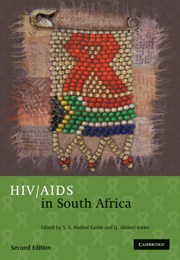Book contents
- Frontmatter
- Contents
- List of Contributors
- Foreword: Peter Piot
- Foreword: Nelson R Mandela
- Acknowledgements
- Section 1 Birth of a rapidly growing epidemic
- Section 2 The virus, the human host and their interactions
- Section 3 HIV risk factors and prevention strategiess
- Section 4 Focal groups for understanding the HIV epidemic
- Section 5 The impact of AIDS
- Section 6 Treating HIV
- 27 Tuberculosis and HIV
- 28 Prevention of opportunistic infections in adults
- 29 Nutritional prophylaxis
- 30 Challenges in managing AIDS in South Africa
- 31 Antiretroviral therapy
- 32 The challenges of implementing antiretroviral treatment in South Africa
- Section 7 What does the future hold?
- Index
29 - Nutritional prophylaxis
Published online by Cambridge University Press: 07 September 2011
- Frontmatter
- Contents
- List of Contributors
- Foreword: Peter Piot
- Foreword: Nelson R Mandela
- Acknowledgements
- Section 1 Birth of a rapidly growing epidemic
- Section 2 The virus, the human host and their interactions
- Section 3 HIV risk factors and prevention strategiess
- Section 4 Focal groups for understanding the HIV epidemic
- Section 5 The impact of AIDS
- Section 6 Treating HIV
- 27 Tuberculosis and HIV
- 28 Prevention of opportunistic infections in adults
- 29 Nutritional prophylaxis
- 30 Challenges in managing AIDS in South Africa
- 31 Antiretroviral therapy
- 32 The challenges of implementing antiretroviral treatment in South Africa
- Section 7 What does the future hold?
- Index
Summary
THE CLINICAL OUTCOME OF HIV-infection and tuberculosis is adversely affected by malnutrition. At the household level, HIV infection is a major threat to food security in South Africa.
Weight loss of more than 10% predicts mortality in hiv-infected adults with advanced disease, independently of immune status and also leads to an increased incidence of opportunistic infections. Loss of lean mass is thought to be an independent predictor of survival.
Long-term use of antiretroviral therapy is associated with changes in body fat distribution and can result in the lipodystrophy syndrome.
There is evidence that improved diet can improve the energy and nutrient in take of people living with hiv and aids. In industrialised countries, nutritional supplements are often used, but there is limited evidence of their effectiveness. This supplementation may be more beneficial in populations with poor baseline nutrition.
Asymptomatic micronutrient deficiencies may occur among those living with hiv. There is evidence to suggest that low dietary intakes or blood levels of several vitamins and minerals may be associated with increased hiv disease progression and/or mortality. This may be due to the oxidative stress of hiv infection, as well as the role that micronutrients play in maintaining normal immune function. Adequate diet is the preferred method of correcting micronutrient deficiencies, but it is likely that daily micronutrient supplements will be needed in developing countries.
In South Africa, a national poverty eradication strategy is urgently needed to address the impact of hiv/aids on food security.
- Type
- Chapter
- Information
- HIV/AIDS in South Africa , pp. 489 - 502Publisher: Cambridge University PressPrint publication year: 2010



